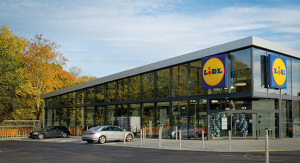Lidl Is The New German Discount Grocer In Town Image courtesy of Lidl
Consumerist’s readers are mostly huge fans of German discount grocer Aldi, but are you ready to welcome another discount grocer from that country into your heart and your shopping list? European supermarket chain Lidl hopes that’s the case.
First, let’s address the important question while you read this article to yourself in your head: How are you supposed to pronounce the store’s name? In Germany, people pronounce the first syllable like a long “E” in English, or LEE-dil. In the company’s other Anglophone markets in the United Kingdom and Ireland, people pronounce the name to rhyme with “middle” or “fiddle.”
Lidl is taking its time with its United States rollout. It has experience expanding to new markets, already having stores in 27 different countries. The Washington Post reports that the company has a prototype store in Virginia, and plans to open its first 20 stores in the United States this summer. They’ll be in Virginia and in North and South Carolina.
So far, it sounds like the chain will offer what American consumers love about its global competitor Aldi, but in a larger format store. Lidl’s U.S. stores will be around 20,000 square feet, while a typical Aldi store has 10,000 square feet of sales floor. Stores will have only six aisles and display some merchandise on islands, making them easy to navigate.

A Lidl store in the UK.
Lidl bills itself as a discount grocer, and will offer national brands alongside its private-label products. It also plans to bring over its aisle of non-grocery items, which rotates according to what’s available and could include anything from electronics to irons. That, too, is a familiar feature for American Aldi shoppers.
Lidl USA plans to have 100 stores open by the end of 2018. That’s a teeny fraction of the 10,000 stores it has globally, but the chain is thinking long-term.
Want more consumer news? Visit our parent organization, Consumer Reports, for the latest on scams, recalls, and other consumer issues.

